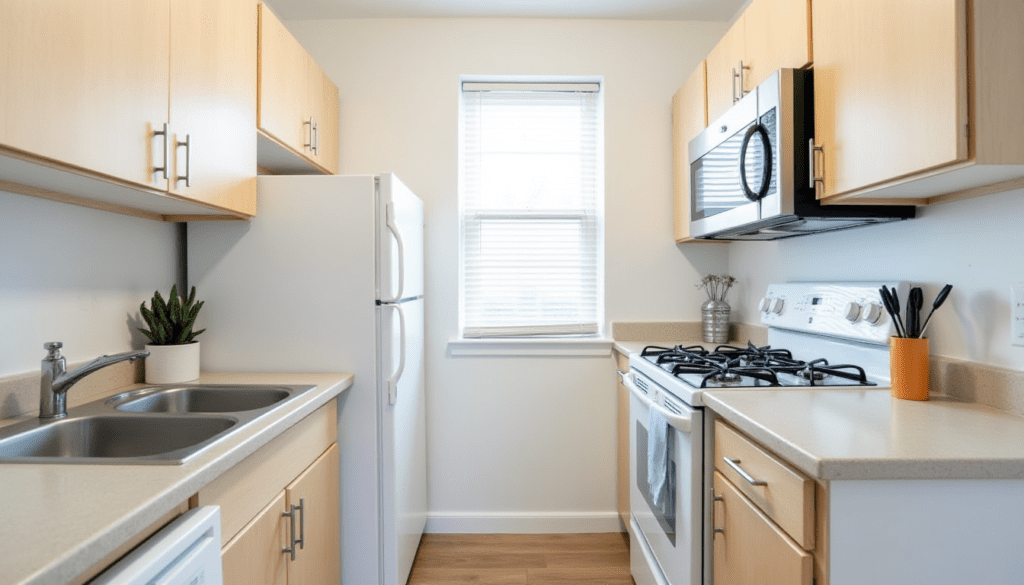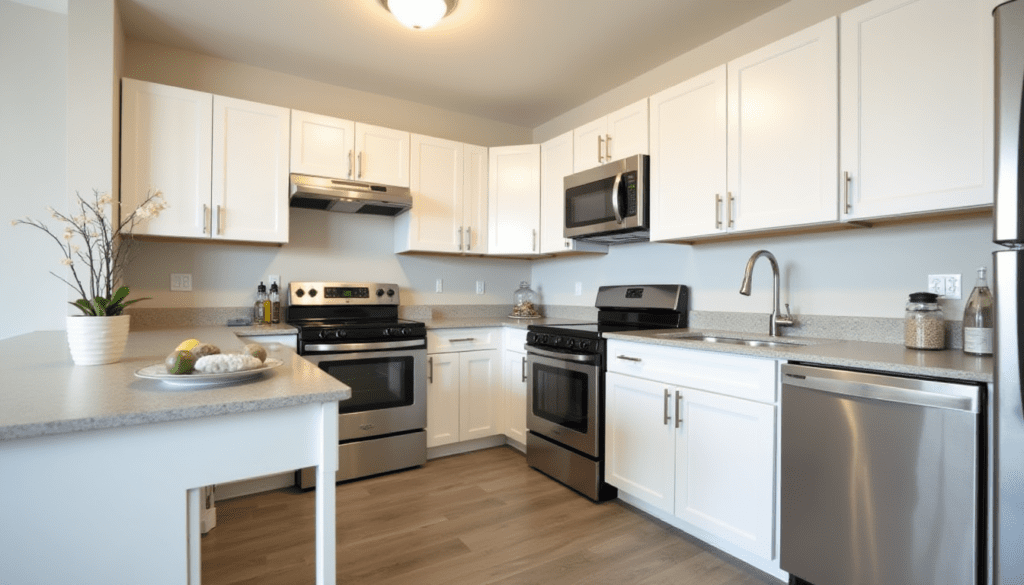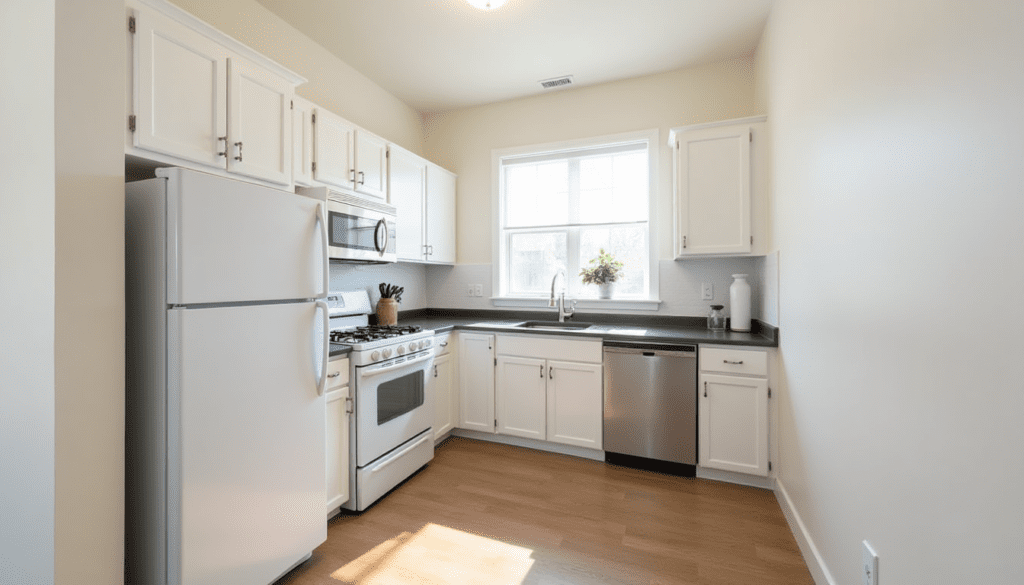What is a Month‑to‑Month Rental Agreement?
A month-to-month rental agreement — sometimes referred to as a periodic lease or tenancy at will — is a housing contract that automatically renews each month until either the landlord or tenant chooses to terminate it. Unlike fixed-term leases, which usually last for 12 months or more, month-to-month agreements are designed for short-term or indefinite living arrangements with more built-in flexibility. These agreements are legally binding and must still include all standard lease terms, such as rent amount, due date, and maintenance obligations.
In New Jersey, including Verona, month-to-month leases are common in situations where the tenant is unsure how long they will stay or when a traditional lease has ended and no renewal has been signed. For instance, if your 12-month lease ends and neither party signs a new agreement, the lease typically converts to a month-to-month by default under NJ landlord-tenant law.
This flexible lease structure is especially beneficial in today’s market where renters are waiting for interest rates to drop before buying a home, or landlords are considering property renovations or sales. Despite their casual reputation, month-to-month leases are subject to the same legal framework as longer leases — making written documentation, clarity of terms, and proper notice absolutely essential.
Legal Requirements in New Jersey
Though flexible in nature, month-to-month rental agreements in New Jersey must comply with legal requirements governed by the New Jersey Truth in Renting Act. These laws apply to most residential rental properties across the state and are enforced at both the state and local levels, including in municipalities like Verona.
New Jersey protects both landlords and tenants by requiring clear notice procedures, security deposit regulations, and legal avenues for terminating or modifying rental agreements. Verona also enforces local housing ordinances and, in some cases, rent control policies that impact how a landlord may operate a month-to-month lease.
Understanding the legal foundations of these agreements helps avoid costly disputes or unlawful evictions. Below, we’ll explore two key legal areas that every landlord and tenant must consider: notice periods and rent control compliance.
Required Notice Periods
One of the most critical aspects of a month-to-month rental agreement is the notice requirement. Since the lease renews every 30 days, either party can choose to terminate the lease or propose changes — but only with 30 days’ written notice. This requirement ensures a fair window of time for tenants to find new housing or for landlords to locate new renters.
Here’s how it breaks down:
- Tenants: To end a month-to-month lease, tenants must give at least 30 days’ written notice before the next rental period begins. For example, if rent is due on the first of the month and you plan to move out at the end of August, you should give notice no later than July 31st.
- Landlords: Landlords must also give 30 days’ written notice to terminate a tenancy, raise the rent, or change the lease terms. Notice must be delivered in writing and dated to be legally valid. Certified mail or documented email is recommended.
Failing to follow these protocols can result in legal disputes or financial penalties. In some cases, landlords who remove tenants without proper notice could be in violation of New Jersey eviction laws, which provide strong protections for renters.
Rent Increase and Rent Control Rules
Rent control is a significant consideration in Verona, NJ. While not all rental units are subject to local rent control laws, those that are must comply with strict limits on how often and how much rent can be increased. Verona’s rent leveling ordinance, as outlined in ECode360, applies to many multi-unit dwellings and requires landlords to register their rental units and adhere to capped increases set by the town’s rent control board.
If your property is not covered by rent control — such as a newer construction or a single-family home — you can raise the rent on a month-to-month lease with 30 days’ written notice. However, arbitrary or excessive rent increases may still be challenged in housing court if they are deemed retaliatory or discriminatory.
Here are a few key guidelines for Verona landlords:
- Review Verona’s local rent control ordinance to see if your unit is covered.
- Provide written notice of rent increases at least 30 days before they take effect.
- Ensure increases are not excessive or in response to tenant complaints or repair requests, which may be considered retaliatory.
Advantages for Tenants
Opting for a month-to-month rental agreement in Verona NJ provides tenants with invaluable freedom and adaptability. In today’s fast-paced world, renters aren’t always certain where they’ll be in a year—whether that’s due to a new job, education opportunity, or personal changes. A month-to-month lease offers the ability to respond quickly to life’s shifts without the financial penalty of breaking a fixed-term contract.
Consider Sarah, a young professional relocating to Verona for a temporary work assignment. Rather than committing to a year-long lease in case her contract ends sooner, she chose a month-to-month lease. When her project concluded after eight months, she simply gave 30 days’ notice and moved without penalty or stress. This flexibility is what makes month-to-month rentals a smart choice in Verona’s rental market.
Additional tenant benefits include:
- No long-term commitment: Ideal for travelers, contract workers, or individuals testing Verona neighborhoods.
- No hefty buyout fees: As long as tenants provide the required notice, they can exit without financial burden.
- Flexibility to upgrade or downsize: Tenants can easily move to a bigger or smaller home when life demands it.
- Peace of mind: Knowing you won’t be tied to the same place for months or years—no unexpected renewals.
With Verona’s close-knit community and access to urban amenities, month-to-month leases are popular among people who’re exploring the town before making long-term housing decisions.
Advantages for Landlords
Landlords in Verona, NJ can also gain powerful advantages from offering month-to-month leases. Most importantly, these agreements allow them to adapt their rental strategy as market conditions shift. Whether vacancy rates fall, renovation opportunities arise, or the landlord plans to sell the property, a month-to-month structure offers more control over property use and income.
For example, Michael, a Verona property owner, had plans to renovate one of his rental units in six months. Rather than signing a year-long tenant, he leased it month-to-month, allowing him to notify the tenant and start renovation on relatively short notice—no broken lease required.
- Adjustable rent levels: Without being locked into outdated rates, landlords can promptly update rents with 30-day notice, staying in line with local market trends.
- Faster tenant turnover: End leases quickly to prepare for sale, redevelopment, or personal use.
- Reduced vacancy risk: The property remains tenanted during transitional periods, such as between sales or before launching remodels.
- Screen-before-commit approach: Landlords can test renters’ reliability before offering a longer lease.
However, landlords should be aware of local regulations before making changes. In Verona, rent-controlled properties require council approval for rent increases and adherence to procedural vulnerability.
Common Lease Terms in Verona NJ
Even with flexibility, a month-to-month rental agreement must include detailed terms to protect both tenants and landlords. In Verona, it’s crucial to add comprehensive clauses addressing rent, deposits, maintenance, termination, and legal compliance under New Jersey law.
Key sections to include:
- Monthly rent amount, due date, payment method
- Late fee structure and grace period
- Security deposit amount, interest, and return terms
- Maintenance responsibilities for each party
- Pet policies, occupancy limits
- Termination notice procedures
- Local compliance statements (e.g., Verona rent control, lead paint disclosures)
While you’ll want the entire lease to be thorough, here are two critical elements every month-to-month lease must cover:
Rent, Due Dates & Late Fees
Clarity on rent timelines and penalty structure is essential. A standard clause might read:
“Tenant agrees to pay monthly rent of $1,800, due on the 1st of each month. A five-day grace period is allowed. After the 5th, a $50 late fee will be applied, plus $5 for each additional day late.”
Including a detailed payment schedule—covering acceptable forms of payment, where rent should be sent, and who it’s addressed to—eliminates confusion. In Verona, overdrawing or missed payments could be challenged if the notice wasn’t clearly stated in the agreement.
Rent in non-controlled units can be increased with a minimum of 30 days’ written notice, but landlords should consider fair-market rates. In rent-controlled buildings, increases typically must be approved by Verona’s Rent Control Board and registered accordingly.
Security Deposits & Returns
New Jersey limits security deposits to 1.5 times the monthly rent. Deposits must be held in a separate interest-bearing account, and within 30 days of receipt, the landlord must provide the tenant with written notice detailing the deposit terms and account information.
Guidelines for deposits include:
- Max deposit: $2,700 for a $1,800 rent
- Deposit handling: Separate interest-bearing escrow account
- Timeline: 30 days to notify tenant; 30 days to return after move-out (minus deductions)
- Deductions: Unpaid rent, repairs above normal wear, missing keys/locks
Both landlord and tenant benefit from a move-in checklist and dated photos to document the property’s condition. These items help avoid disputes at move-out and support any legitimate deductions.
Maintenance Responsibilities & Repairs
Maintenance is one of the most overlooked but vital parts of any month-to-month rental agreement in Verona, NJ. Although these agreements are short-term, both parties are still bound by New Jersey law regarding property upkeep and repair obligations. The responsibilities should be clearly defined in the lease to prevent misunderstandings and ensure a habitable living environment.
Under the New Jersey Truth in Renting Act, landlords are legally required to maintain the property in safe, livable condition. This includes functional plumbing, heating, hot water, electrical systems, and pest-free conditions. Local Verona ordinances may also impose property maintenance codes that require landlords to ensure proper garbage disposal, fire safety, and building code compliance.
Tenants are typically responsible for basic cleanliness and minor upkeep, such as:
- Replacing light bulbs and air filters
- Keeping the property clean and damage-free
- Reporting any safety issues or damages immediately
Meanwhile, landlords must handle:
- Major repairs (HVAC, electrical, plumbing)
- Routine building inspections and code compliance
- Fixing damage not caused by tenant misuse
It’s best to include a clause that clarifies how quickly landlords must respond to repair requests and how tenants should report problems—usually in writing or through a property portal.
Transitioning from Fixed‑Term Lease
Many month-to-month rental agreements in Verona don’t begin that way. Instead, they often arise when a fixed-term lease (such as a 12-month lease) ends and the tenant remains in the unit without signing a new contract. This situation results in an automatic month-to-month tenancy under New Jersey law, unless the lease explicitly says otherwise.
Here’s a typical scenario: A tenant signs a one-year lease, which expires on June 30. Neither party signs a new lease, and the tenant continues paying rent on July 1. At this point, the lease becomes a legal month-to-month agreement. The tenant is now required to give 30 days’ written notice before vacating, and the landlord must also give the same notice to terminate or raise the rent.
If you’re planning to transition a fixed-term lease to month-to-month on purpose, it’s best to draft a brief addendum that outlines:
- Start date of the new month-to-month term
- Any changes in rent or conditions
- Written notice requirements for both parties
Having a written agreement ensures continued legal clarity and protects both sides should conflicts arise. Landlords especially benefit from formalizing the new arrangement, since it resets expectations and eliminates “implied” terms from the previous lease.
Breaking the Lease Early
One of the biggest advantages of a month-to-month lease is the ability to end it without legal or financial penalties—if done correctly. Both landlords and tenants in Verona must provide at least 30 days’ written notice before terminating the lease. This notice must be delivered before the start of the next rental period.
For example, if a tenant plans to vacate on October 31, their notice must be given no later than October 1. Notice can be delivered via email (with confirmation), certified mail, or in person with a signed receipt.
However, there are some exceptions to the 30-day rule:
- Military deployment: Tenants called to active duty are protected under federal law and may break the lease immediately with documentation.
- Habitability violations: If a landlord fails to maintain the property, tenants may terminate the lease early, often with legal backing.
- Mutual agreement: Both parties can agree to end the lease earlier if documented in writing.
Landlords must never attempt “self-help” evictions, such as changing locks or turning off utilities. New Jersey law strictly prohibits these actions and considers them illegal, regardless of the lease type.
Month‑to‑Month vs. Fixed‑Term Leases
While both lease types are legal and widely used in Verona, NJ, they serve different purposes depending on the renter’s and landlord’s goals. Let’s look at how month-to-month agreements compare to traditional fixed-term leases:
| Feature | Month-to-Month Lease | Fixed-Term Lease |
|---|---|---|
| Length | Renews every 30 days | Usually 12 months |
| Termination Notice | 30 days required | Early exit fees may apply |
| Flexibility | High | Low |
| Rent Increases | Can occur every month (with notice) | Typically fixed until renewal |
| Ideal For | Short-term renters, transition periods | Long-term stability, families |
In general, month-to-month leases in Verona NJ work best for people with short-term needs or landlords planning to change their property use soon. Fixed-term leases are better suited for renters who prioritize stability and predictable expenses.
Benefits of Flexibility
The defining feature of a month-to-month rental agreement is flexibility. It’s this flexibility that makes it so attractive for tenants in transition and landlords seeking control over their property timeline. Whether you’re moving to Verona temporarily, trying out a new neighborhood, or preparing to sell a rental unit, these agreements deliver freedom without the constraints of long-term contracts.
Top flexibility benefits for tenants include:
- Ability to relocate without breaking a lease
- Try-before-you-commit housing in Verona’s diverse neighborhoods
- Time to wait out mortgage interest rates before buying a home
Top flexibility benefits for landlords include:
- Freedom to sell or renovate with minimal legal risk
- Higher turnover for seasonal or short-term units
- Quicker response to market shifts and pricing trends
In a community like Verona, where quality of life is high and housing demand remains strong, a well-structured month-to-month lease can offer convenience and adaptability while still providing legal protections on both sides.
Potential Drawbacks
While month-to-month rental agreements in Verona, NJ offer valuable flexibility, they also come with several potential downsides that renters and landlords must weigh carefully. What these leases offer in convenience, they often lack in long-term stability or cost predictability.
For tenants: The biggest risk is early lease termination. Since landlords can end the agreement with only 30 days’ notice, renters may find themselves scrambling to find a new place with little time to prepare — especially in a competitive housing market like Verona.
Additionally, month-to-month leases are more vulnerable to frequent rent increases. While landlords must provide written notice, they can legally adjust rent multiple times per year unless the property is rent-controlled. This unpredictability may cause budgeting issues for renters who prefer stable monthly expenses.
For landlords: Shorter leases create more frequent turnover, which means increased time spent marketing, screening tenants, and preparing units between occupancies. It also introduces more administrative work — especially when managing multiple properties or dealing with compliance under Verona’s rent control regulations.
Who Should Choose a Month-to-Month Lease?
Not every tenant or landlord will benefit from a month-to-month lease — but for the right people, they’re an excellent fit. Here’s who might find them especially useful:
Ideal tenants for month-to-month agreements in Verona include:
- People relocating for work or short-term contracts
- Students attending colleges nearby (e.g., Montclair State)
- Individuals waiting to buy a home
- Renters unsure about long-term plans
- Tenants “testing out” Verona before committing to a year lease
Ideal landlords include:
- Owners planning to sell or renovate in the next 3–6 months
- Landlords testing market pricing
- Property owners running seasonal or transitional rentals
- Landlords looking to screen tenants before offering a 1-year lease
Ultimately, a month-to-month lease is best when flexibility outweighs the need for long-term security. In Verona, where community growth and housing demand remain strong, this lease model allows both sides to adjust as life (and the market) evolves.
Sample New Jersey Month-to-Month Lease Template
Below is a simplified example of a month-to-month lease clause, suitable for use in Verona. Always consult a legal advisor or property manager to ensure your lease complies with state and local law.
MONTH-TO-MONTH RENTAL AGREEMENT – VERONA, NJ Date: [Insert Date] Landlord Name: [Full Name] Tenant Name: [Full Name] Rental Address: [Full Property Address, Verona, NJ] Monthly Rent: $[Amount] Due Date: 1st of each month Security Deposit: $[Amount] Late Fee: $[Fee] after [#] grace days Term: This is a month-to-month tenancy beginning on [Start Date]. Either party may terminate the agreement with 30 days' written notice. Utilities Paid By: [Landlord / Tenant] Maintenance: [Details or Refer to Addendum] Signatures: Landlord Signature: ______________________ Date: ________ Tenant Signature: _______________________ Date: ________
Frequently Asked Questions
What is a month-to-month rental agreement in NJ?
It’s a rental lease that automatically renews every 30 days and can be ended at any time with 30 days’ written notice from either the tenant or landlord.
Can a landlord raise rent every month?
Yes, unless the property is subject to rent control. However, landlords must give 30 days’ written notice for any increase.
How much notice does a tenant have to give in Verona, NJ?
Tenants must provide at least 30 days’ written notice before the next rental cycle begins to legally terminate a month-to-month lease.
Is a written lease required for month-to-month rentals?
Not required by law, but strongly recommended. Verbal agreements are valid, but they often lead to misunderstandings or legal challenges.
What happens if the tenant stays without notice?
The lease renews for another month. The landlord may charge rent and must still give 30 days’ notice to end the lease legally.
Conclusion & Next Steps
As Verona continues to attract new residents, month-to-month rental agreements have become a go-to solution for people seeking short-term flexibility and minimal risk. These leases are easy to start, simple to end, and ideal for situations where uncertainty makes long-term contracts undesirable.
However, both tenants and landlords must understand their legal rights and responsibilities. From notice periods and rent control to maintenance and security deposits, there’s a lot more to a month-to-month lease than just its short duration. That’s why having a properly structured agreement — preferably reviewed by a professional — is essential.
When handled correctly, month-to-month agreements can benefit both parties, providing freedom, protection, and peace of mind.
Call to Action – Contact Rent Shield Property Management
Are you a tenant searching for a flexible lease in Verona, NJ? Or a landlord needing help creating a legally sound month-to-month rental agreement?
Rent Shield Property Management is here to help. We provide:
- Customized lease drafting and review
- Expert knowledge of Verona rent control and NJ housing laws
- Ongoing tenant and landlord support
📞 Contact us today to schedule a consultation. Let’s simplify your leasing experience and protect your property the right way.






